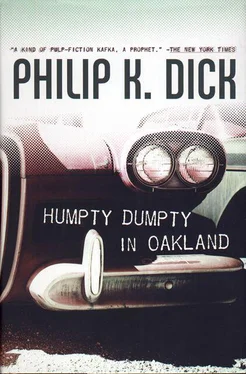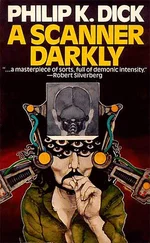“Too old?” the man said.
“Heart or something,” Al murmured.
“Well, I am certainly sorry,” the man said. “Really sorry. It’s the end of an era. The end of the old craftsmanship.”
Al nodded.
“I haven’t been in for a month or so,” the man said. “When did he decide? He must have just decided.”
“Yes,” Al said.
The man put out his hand; Al noticed it, started, drew his own hand out and shook. “My name is Harman,” the man said. “Chris Harman. I’m in the record business. I run Teach Records.”
“I see,” Al said.
“You don’t think he’ll be back,” Harman said, again looking at his watch. “Well, I can’t wait. Tell him I was by. I’ll call him on the phone and tell him how sorry I am. Good day.” Nodding, and giving a friendly wave to Al, he got back into his Cadillac, shut the door, shifted into reverse, and, in a moment, had backed from the lot and out into the San Pablo traffic. Presently the Cadillac had disappeared from sight.
Half an hour later the old man’s Pontiac appeared and parked. As Fergesson got out, Al walked up to him.
“An old customer of yours came by,” he said. “He was sorry to hear you sold the garage.”
“Who?” Fergesson said, as he unlocked the garage door and pushed it up with both hands. With a worried expression he started into the garage. “God damn,” he said, “I’m really behind, now, with that job, having to go out like that.”
“Harman,” Al said, following along after him.
The old man said, “Yes, a ’58 Cadillac. Good-looking guy, silver hair. Around fifty.”
“Owns a record line or something,” Al said.
The old man switched on a trouble lamp and dragged the long rubber cord across the grease-covered floor of the garage, toward a Studebaker which was up on the hoist. “You know that brick building up on 23rd, just off Broadway? Up where those new car agencies are? Near where you branch off to get to the lake? Anyhow, his place is up there. He owns the whole building; it’s all his record company. He makes records. A presser.”
“So he said,” Al said. He waited for a time, watching the old man lie down on his back on the flat cart with its castors; Fergesson rolled skillfully beneath the Studebaker and resumed work.
“Listen,” the old man said, from beneath the car.
Al bent down.
“He makes dirty records,” the old man said.
At that, Al felt his scalp crawl. “That well-dressed guy? With that car?” He could hardly believe it; in his mind he would have pictured it completely the other way. A man who made dirty records . . . it would be a short, greasy, sloppily-dressed man, with perhaps green-tinted glasses, a furtive look, bad teeth, a hoarse voice, picking his teeth with a toothpick. “No kidding,” he said.
“That’s only one thing he makes,” the old man said. “That’s just between you and me; it’s not public.”
“Okay,” Al said, interested.
“It’s not his name on it, Teach Records. It’s one of those party labels, I mean, no label at all.”
“How do you know?”
“He came by about a year ago. He’s been coming to me to get his car fixed for years. He brought a box of dirty records and wanted me to sell them.”
Al laughed. “No kidding.”
“I—” The old man wheeled himself out for a moment, lying on his back and looking up at Al. “I kept the box around for a while, but it didn’t do anything. There were some folders.” He got laboriously to his feet. “I think I’ve got a couple left. Sort of dirty-joke folders advertising the records.”
“I’d like to see them,” Al said. He followed the old man into the office, where he stood as the old man rummaged in the overflowing desk drawers. At last, in an envelope, the old man came onto what he wanted.
“Here.” He passed the envelope to Al.
Opening the envelope, Al found some glossily-printed small folders, the size to be put out in a little heap on a counter. A drawing on the front, of a nude girl, with the words SPREE RECORDS SUMMER FUN-FEST LIST (FOR MEN ONLY), and then, inside, a list of titles. The tides themselves had nothing dirty about them.
“Songs?” he said. “Like ‘Ruth Wallace’?”
“Mostly monologues,” the old man said. “I listened to one. It was about Eva crossing the ice; you know, in Uncle Tom’s Cabin.”
“Was it dirty?”
“Really dirty,” the old man said. “Every word I ever heard. Some guy was reading it. Harman said it was some great comedian who writes a lot—or wrote a lot; he said the guy was dead, I think—for all the major magazines. Some really famous guy. You would have recognized the name. Bob something.”
“You don’t remember it?”
“No,” Fergesson said.
“I’ll be darned,” Al said. “I never met a guy who makes dirty records, before. It’s illegal, isn’t it? Records like that.”
“Sure,” the old man said. “He makes a lot of other stuff, too. But that’s all I saw, just that one thing. I think he puts out some jazz and even some classical stuff. Specialty stuff. Several lines.”
Turning to the back of the folder, Al saw that there was no address. No manufacturer. “I thought he was a banker,” he said. “Or a lawyer or a business man.”
“He is a business man.”
That was so. Al nodded.
“He makes a lot of money,” the old man said. “You saw his car.”
“Plenty of people drive Cads,” Al said, “who don’t have a bean.”
“You should see his house. I have; I let him off there one day. He’s got a place up in Piedmont. Practically a mansion. With trees and hedges all around it. And a wrought-iron gate. Ivy growing up the side of the house. And a really classy-looking wife. He’s got at least one other car, too. A Mercedes-Benz sports car.”
“Maybe not paid for,” Al said. “He could have almost no equity in the house. I will admit he knows how to dress.”
“And yet he’s been here,” the old man said, “and stood around and talked to me, and not acted snotty; not acted like he had on a nice suit like that and was in a garage.”
“Some guys have that,” Al said. “A real gentleman has that. Grace. It’s part of being a real aristocrat.” But, he thought, not the kind of profession he had ever identified with the aristocracy. “I hope we’re talking about the same guy,” he said.
“Ask him when you see him again,” the old man said. “He’ll probably be back if he needs some work done on his car. Ask him if he doesn’t sell party records.”
“Maybe I will,” Al said.
“He’ll tell you to your face,” the old man said. “He’s not ashamed. It’s a business. Like any other.”
“Hardly that,” Al said. “Hardly like any other, considering it’s illegal. You could probably put the guy in jail with what you know. You better not tell anybody; I hope you aren’t telling everybody you see. Didn’t he say to keep it quiet?”
His face flushing, Fergesson said, “I never told anybody but you. Now I wish I hadn’t told you. Get off my back.” So saying, he wheeled himself under the Studebaker once more and resumed work.
“No offense,” Al said. He wandered back out of the garage again, into the bright sunlight.
I could blackmail him, he thought. The idea bolted through his mind for an instant, sweeping everything away, leaving him trembling.
Obviously Harman no longer made dirty records; this was a thing out of his past. Probably in those days he had not been wealthy, well-dressed, fashionable. Maybe he had just been starting out; he had not yet arrived. This was a period in his life that he hoped to conceal forever.
Thinking that, he felt himself become cold and then even colder; he felt his heart cease beating for a moment. That really made the blackmail business into something plausible.
Читать дальше










